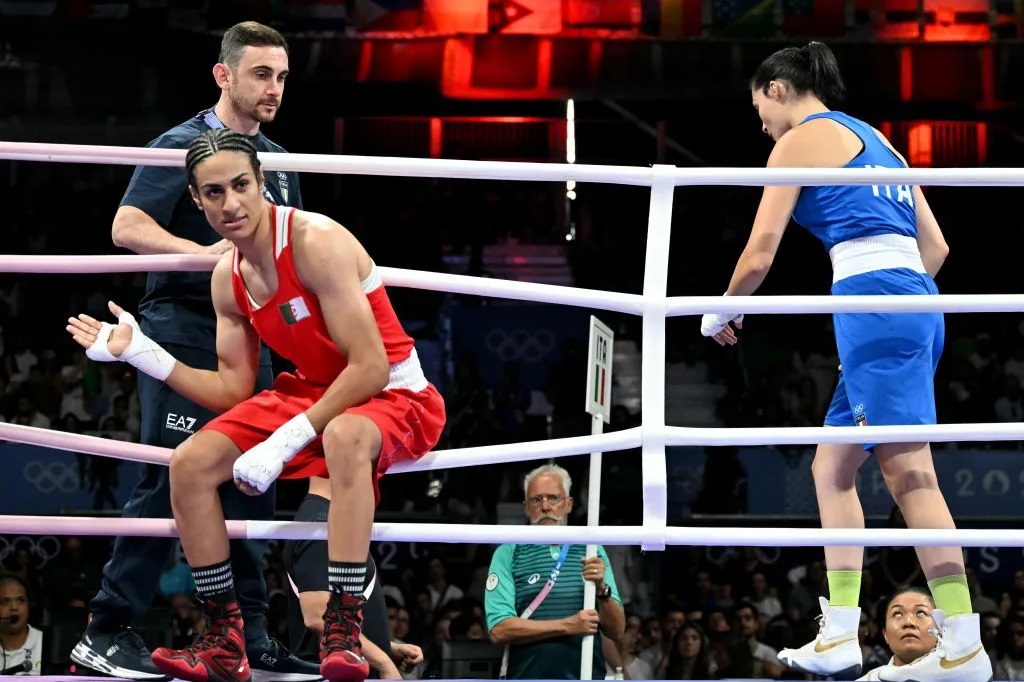The hugely controversial Olympic boxing bout between Italian Angela Carini and her opponent Imane Khelif from Algeria lasted just forty-six seconds. After taking two punches from Khelif to the chin, Carini was forced to quit, saying she had done so “to save my life.” She said she had “never felt punches like it,” after sustaining a suspected broken nose. Carini sank to her knees in the center of the ring and wept openly at having her Olympic dream shattered. “It’s not fair,” she cried out. It is a damning charge that will go on to haunt these games.
Carini was hit by two savage punches from Khelif and the force of the blows was so great that she immediately felt she was in serious danger. She revealed afterwards that she had pulled out after being hit harder than she had ever been hit before. A first punch dislodged her chin strap and a second smashed her chin. Her shorts were splattered with blood. Fighting back tears after deciding to abandon the bout, she said: “I am heartbroken. I went to the ring to honor my father. I was told a lot of times that I was a warrior but I preferred to stop for my health. I have never felt a punch like this.” On the official Olympics feed, the director cut away from the ring just as Carini was dropping to her knees, showing a photograph of the Eiffel Tower instead. After the bout, Khelif didn’t answer questions from reporters but stopped briefly to speak to the BBC: “I am here for gold,” the Algerian said. “I will fight anybody. I will fight them all.”
This “fight” was over in less than a minute. Yet Carini is no beginner, new to boxing. She is a gifted and experienced fighter, who has won silver medals at world and European level. She knows what it is like to take on tough opponents but this bout was something else altogether.
Alarm bells rang for her straightaway — for the very reasons that this particular bout has attracted controversy from the off. Khelif is one of two boxers permitted to fight at the Olympics, despite being disqualified from the women’s world championships last year for failing testosterone and gender eligibility tests. The International Boxing Association (IBA) made the ruling, saying the boxer had “elevated levels of testosterone that failed to meet the eligibility criteria.” Khelif is not transgender but has blood testosterone levels typical of men.
On Wednesday evening, the IBA also revealed that Khelif initially appealed the decision to the Court of Arbitration for Sport “but withdrew the appeal during the process, making the IBA decision legally binding.” The decision to allow Khelif to compete in Paris is down to the Olympics organizers who have their own rules, which are somewhat less stringent. The IOC spokesman Mark Adams had this explanation: “I repeat that all the competitors comply with the eligibility rules. But what I would say is that this involves real people. And, by the way, this is not a transgender issue. I should make this absolutely clear to everyone.”
Few will be convinced by this word salad of a statement. The eligibility rules are far from clear, according to critics of the decision-making process. Is anyone really surprised that this controversy is turning into a rolling disaster for the Olympics bigwigs?
Australia’s boxing captain, Caitlin Parker, has voiced fears that one of her team-mates is fighting in the same weight category as Khelif. “I don’t agree with them being allowed to compete in sport, especially combat sports,” Parker said. “It can be incredibly dangerous.” Reem Alsalem, the UN Special Rapporteur on violence against women and girls was scathing saying that Carini and other female athletes “should not have been exposed to this physical and psychological violence based on their sex.” The Italian prime minister Giorgia Meloni has also weighed in, saying it is important to protect “the right of female athletes to be able to compete on equal terms.” The questions are coming thick and fast for those who sanctioned this boxing mismatch but they have only themselves to blame for this self-inflicted mess.
This article was originally published on The Spectator’s UK website.


























Leave a Reply